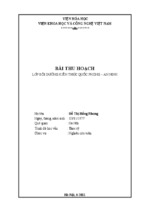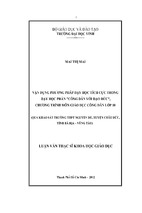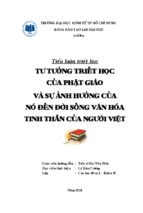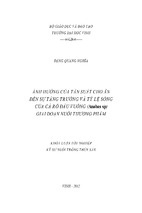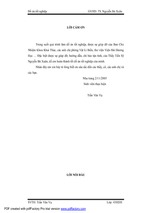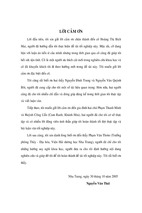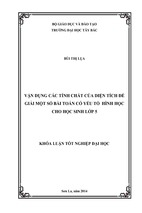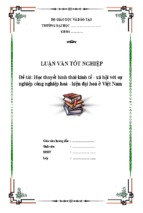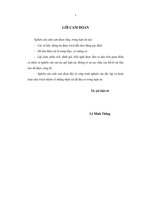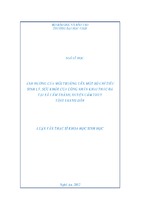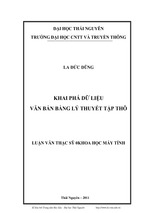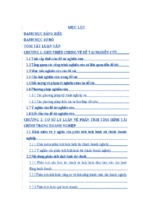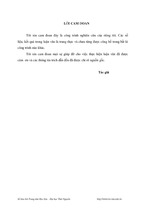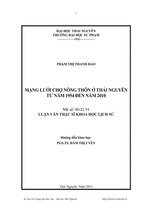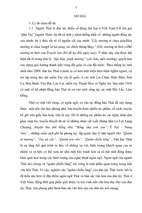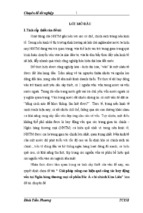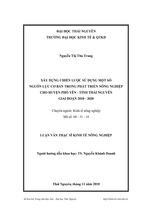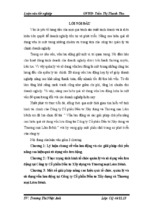MINISTRY OF EDUCATION AND TRAINING
VIETNAM NATIONAL INSTITUTE OF EDUCATION
------------------
NGUYEN ĐUC GIANG
DEVELOPING INDEPENDENT LEARNING COMPETENCY
FOR STUDENT TEACHERS USING
THE POSITIVE TEACHING APPROACH
Major: Analysis and History of Education
Code: 9 14 01 02
SUMMARY OF DOCTORAL DISSERTATION
OF EDUCATIONAL SCIENCES
Hanoi, 2021
The work has been completed at: The Vietnam Institute of Educational
Sciences
Supervisor Assoc
Prof. Ph.D. Nguyen Duc Quang
Prof. Ph.D. Nguyen Vu Bich Hien
Reviewer 1: ....................................................................
....................................................................
Reviewer 2: ....................................................................
....................................................................
Reviewer 3: ....................................................................
....................................................................
The doctoral dissertation will be defended at the Academic-level Dissertation
Assessment Council at the Vietnam Institute of Educational Science, No. 101
Tran Hung Dao, Hanoi.
Time : ..... date ..... month .... year ............
The dissertation can be further referred at:
- The National Library of Vietnam
- The Library of the Vietnam Institute of Educational Science
1. The necessary of the study
Fostering and developing Independent learning competency have received special
attention from the Party, the State and the Ministry of Education and Training. This is
reflected in many resolutions of the Party, legal documents of the State throughout the
development of the country.
With the context of globalization and knowledge economy, today's world is changing
very rapidly in all aspects, many knowledge that has just been born soon becomes obsolete
and people are constantly searching, discover new knowledge to meet the demands of the
times. Accordingly, modern teaching theory specifies that the teacher is from the task of
imparting knowledge to the task of orientation, organization, and teaching to
learners. Learners must actively and actively occupy knowledge. The role of Independent
learning is very important: … Independent learning is the golden key that needs to be
further sharpened in the stage of industrialization and modernization of our country in the
twenty-first century.
In the theory of university teaching, teachers know that higher education should
encourage students to express a personal opinion of the subject regardless of whether that
viewpoint is right or wrong, but in fact the teacher often imposes an answer. Standard
judgment with a question posed to students. That is the reason why teachers often fall into
a dilemma when they have to choose to apply communicative teaching methods or guide
students to Independent learning because when students learn the same thing according to
teaching method, it will be easy for students to learn the same thing. in controlling the
learning and evaluating student performance.
In the 60s of the twentieth century, Carl Roger's view pointed out that it is necessary
to teach learners how to adapt to change. He realized that he could not provide enough
knowledge for learners, he had to guide learners how to find new knowledge to help
learners satisfy. Furthermore, one of the mottos of higher education is to meet all the needs
of learners in a particular direction. Allows students to Independent learning, Independent
learning according to the curriculum. This requires students to take responsibility for their
studies, using the university as a set of resources under their own control. Many lecturers
follow the motto of inspiring students to research, self-explore and share in the classroom
community. However, doing this requires students to have some ability to become
independent learners. The instructor needs guidance to form this independent learning
competency as a key goal of the program.
One of the possible ways to improve students' Independent learning is through active
teaching strategies that promote independent learning. More research is needed to
determine which teaching methods in practice will develop students' Independent learning
capabilities. The results of research will be very important in improving the quality of
teaching and developing theories about teaching strategies to promote Independent
learning competency at both universities and general education levels.
Starting from the above-mentioned facilities, I chose the research topic: Developing
Independent learning competency for pedagogical university students following active
teaching approach as my dissertation topic.
2. Purpose of the study
On the basis of theoretical and practical research on Independent learning
competency and Independent learning competency development, then propose measures
to develop Independent learning competency for students of universities of education
according to active teaching approach.
3. Subject and object of research
3.1. Object of research: Developing Independent learning competency for students of
universities of education.
3.2. Subject of research: Measures to develop Independent learninging competency for
students of universities of education according to active teaching approach.
4. Scientific hypothesis
Independent learning competency directly affects the learning process of pedagogical
university students. Through measures of case study competency following active teaching
approach, accompanied by additional exercises to develop skills will help students develop
and improve their Independent learning competency faster and more sustainably.
5. Task of the study
5.1. Research on the theoretical basis of developing Independent learning competency
for students of universities of education according to active teaching approach.
5.2. Survey the situation of developing Independent learninging competency for
students of universities of education according to active teaching approach.
5.3. Proposing measures to develop mathematical competence for pedagogical
universities according to active teaching approach and pedagogical experiment to verify
these measures.
6. Scope of the study
The limitation of the research content: The topic delves deeply into researching
measures to develop Independent learning competence according to active teaching
approach in teaching methods and forms of organization. The main teaching methods and
forms include: project-based teaching; teaching and problem solving; teaching by
Elearning; teach in a reverse classroom model.
The measures to develop the mathematical competence for pedagogical universities
with the approach of active teaching will be implemented in General Education and the
subject of State Administration and Management of Education and Training.
Limit on research object of topic : Students of pedagogical schools include: Hanoi
National University of Education; University of Languages and International Studies
(ULIS), Vietnam National University-HaNoi (VNU)
Research period of the topic is from 2014 to 2020.
7. Research methods
7.1. Approach methods
7.2. Specific research methods:
7.2.1. Theoretical research method
7.2.2. Group of practical research methods
7.2.2.1. Observation method: Schedule time, observe students' learning activities in
the learning process. The topic will build a sample of competency observation form, based
on competency standards to evaluate.
7.2.2.2. Written investigation method: Using questionnaires to collect information on
issues related to Independent learning competency development activities.
7.2.2.3. Interview method: Using interview questionnaires to collect information
about perceptions and attitudes of students about Independent learning competency and the
status of Independent learning competency development.
7.2.2.4. Experimental method: Pedagogical experiment to verify the feasibility and
effectiveness of the process of educating Independent learninging competency , the set of
standards for evaluating the mathematical competence and steps of the case study
competence for students of universities of education.
7.2.2.5. Expert method: Consult scientists about Independent learning competency
and measures to form Independent learning competency for students.
7.2.3. Data processing: To process data obtained by SPSS software to ensure
reliability.
8. Protection points
It is possible to develop mathematical competence for pedagogic students through
teaching methods and forms of organization, including: project-based teaching; teaching
and problem solving; teaching by Elearning; teach in a reverse classroom model.
In order to develop Independent learning competency for students of pedagogic
universities quickly and sustainably, it is necessary to promote intellectual attributes,
cognitive capacities and create motivation in the process of applying active teaching
methods.
9. New contributions of the dissertation
9.1. As for Theory:
The research results of the thesis contribute to enriching the theory of Independent
learning competency and developing Independent learning competence with active
teaching approach. Re-systematize some of the structural properties of mathematical
competence and the external factors of mathematical competence of pedagogical
students; Some ways to develop mathematical competence according to the approach of
mathematical teaching.
9.2. As for Practice:
The thesis researches and assesses the current status of mathematical competencies
and develops the mathematical competence for pedagogical universities, thereby
completing the system of measures to develop mathematical competence according to the
approach to mathematical teaching, contributing to improving the quality of training at
universities of education.
10. Structure of the dissertation
In addition to the introduction, conclusion and recommendation, the thesis is
structured with 3 chapters .
CHAPTER 1
THEORETICAL BACKGROUND ON DEVELOPING INDEPEMDENT
LEARNING COMPETENCY FOR UNIVERSITY STUDENTS TEACHING
PROFESSIONAL BASED ON POSITIVE TEACHING
1.1. Overview of the study
In the past 10 years, Independent learning and Independent learning researchers have
focused on the components of typical Independent learning competencies such as:
Anthony, 1994; Boekaerts, 1997; Carr, 1996; Malone & Smith, 1996; Schunk and
Zimmerman, 1996; Schwartz and Bransford, 1998; Birenbaum, 2002; Weiss,
2004; Taggart (2005); Bullock & Muschamp, 2006; Bishop, 2006. These scholars show
that Independent learning competency is determined by three internal factors: (1) Some
basic cognitive skills, such as memory, attention, problem solving and creativity; (2) About
the metacognitive skills needed for independent learning; (3) Emotional skills. The most
important of these is emotional skills, often considered the driving force for independent
learning. These elements will be clarified in the next section of the thesis.
Researches on developing Independent learning competency currently focus mainly
on the following issues:
1 / Teaching Independent learning to form Independent learning capacity
2 / Teaching to foster and develop Independent learning capacity
Through an overview of the research works, we found that most of the research authors
emphasize the important meaning of developing Independent learning energy for
students. The research works have shown many ways to develop Independent learning
competence for students. But studies show that in the development of Independent learning
energy for students, there are still many problems that have not been resolved, such as:
factors affecting the development of Independent learning competence, skills to promote the
development of Independent learning competence, optimal measures to develop. Autistic
capability in modern teaching.
1.2. Independent learning competency of pedagogical university students
1.2.1. Concepts of Independent learning and Independent learning competency
1.2.1.1. Independent learning
Based on the concepts, we propose to understand that Independent learning is the
process in which learners mobilize all their intellectual, living, emotional and willpower
abilities to actively impact on the subject of examination. destroy to self-grasp a volume of
knowledge, skills and perfect personal character under the intervention or non-intervention of
the teacher.
1.2.1.2. Competence
In our opinion, NL is the application of knowledge, skills and attitudes to perform
the job tasks in accordance with the standards and criteria for each job task. NL is a
combination of knowledge expertise and professional with skills practice, communicate,
solve the problem of intellectual , attitude profession n gh IEP positive , the desire to
study , ... Y If factors carefully Practical energy is the highest manifestation of energy.
1.2.1.3. Independent learning capacity
In the framework of the thesis, we use the understanding of Independent learning
competency which is the application of knowledge, skills, attitudes and personal attributes
to actively influence the object to be discovered (content learning) in different situations
and contexts in order to achieve high efficiency under the intervention or non-intervention
of the instructor.
1.2.2. Characteristics of pedagogical university students
1.2.3. Structure of Independent learning competency of Pedagogical University
Students
The structure of mathematical competence includes 3 groups: Group of cognitive
powers ; The group of metacognitive powers ; Group of emotional abilities,
motivating
1.2.4. Assessment of Independent learning competency of pedagogical university
students
Assessment of collaborative competence is understood as a process of measuring,
collecting evidence and making judgments about a certain successful / unsatisfactory one
at a time. Because it is not possible to observe the autism spectrum directly, it is necessary
to have some indirect indexes to manifest the autistic energy. The Independent learning
competency assessment criteria are described with 3 large groups:
Criterion 1 : Cognitive competency (9 criteria)
Criterion 2: Metacognitive competencies (7 criteria)
Criterion 3: Motivation competency (7 criteria)
Interpretation for each level as (see full text)
Assessment of mathematical competency of students is done through two forms:
self-assessment and teachers' assessment
1.3. Developing Independent learning competency for pedagogical university students
1.3.1. Develop Independent learning capacity
Independent learning competency development can be understood as the impact of
the educator or the learners themselves on the learner so that they have a higher level of
Independent learning competency than before.
1.3.2. Pathways for developing Independent learning competencies for pedagogical
university students
1.3.2.1. Independent learning in class under the guidance of teachers
1.3.2.2. Independent learning outside of class hours without the direct support of teachers
1.3.3. Factors affecting the development of Independent learning competency for
pedagogical university students
1.3.3. 1. Lecturers and lectures
1.3.3.2. Physical environment factors
1.3.3.3. Intellectual Attributes of Pedagogical University Students
1.4. Developing Independent learning Capabilities for Pedagogical University
students according to active teaching approaches
1.4.1. Positive teaching approach
1.4.1.1. Active teaching understanding
1.4.1.2. Characteristics of active teaching approach
Characteristic 1: Teaching towards problem solving, brainstorming, creativity
Characteristic 2: Differentiated teaching and interpersonal cooperation
Feature 3: Students actively Independent learning the problem
Feature 4: Application of information technology to optimize and diversify time and
space for learning activities
1.4.2. The relationship between active teaching and the development of Independent
learning competencies
• Problem base learning
• Project base learning
• Flip classroom
• Elearning
Positive
teaching
Active
learning
• Problem solving, creativity.
• Dividing and cooperating
among students Proactively
find out the proble
• Optimization, diversification of
time, no time for learning
activities
• Năng lực nhận thức
• Năng lực siêu nhận thức
• Tạo động lực
Independent
learning
Chart 1.1: Showing the relationship between mathematical teaching and the
development of mathematical competence
1.4.3. Developing Independent learning competency for Pedagogical University
students according to active teaching approaches
1.4.3.1. Developing Independent learning competency through project-based learning
(Project-based Learning)
* The impact of project teaching on the practice laboratory
Project teaching methods develop cognitive abilities, metacognition and motivation
for students.
1.4.3.2. Develop Independent learning competency through problem solving teaching
* The impact of problem solving teaching on Independent learning goals
In general, a number of meta-analyzes have proven that students who learn by
problem solving method have slightly lower scores than students who learn by traditional
methods. However, when analyzing and comparing the ability to apply the knowledge
learned in different contexts, the students who learn the problem solving teaching method
do better .
* The impact of problem solving teaching on the development of mathematical
competence
Students taught by problem solving method have transferred learned reasoning to
other issues and created more coherent explanations than those who are not taught by
problem solving method .
1.4.3.3. Develop Independent learning competency through E-learning
* The impact of Elearning teaching on the Practice Skills Laboratory
E-Learning allows students to fully master their own learning process, from the time
and amount of knowledge to learn as well as the order in which the lessons are learned,
especially for online lookup of related knowledge. Instant lessons, quick review of learned
parts, freely exchange with fellow learners or teachers right in the course of learning.
1.4.3.4. Develop the ability to Independent learning through reverse classroom
* The impact of reverse classroom model teaching on the case study
Students will become independent learners by controlling their own learning about
learning speed, mastering the content and the responsibility to prepare for class [64]
[101]. This way of learning requires students to use a lot of mental activity. Thus, the
higher order tasks in the thinking scale are performed by both faculty and students.
CONCLUSION OF CHAPTER 1
1) There are quite a lot of research works on Independent learning and Independent
learning capacity. Most of the study authors emphasize the important meaning of developing
Independent learning competence for students, at the same time the research results show
many ways to develop Independent learning competence for students. However, there are
still many issues that need further research when referring to Independent learning
competence and laboratory of Independent learning competence such as factors affecting the
development of Independent learning competence, skills to promote the development of
Independent learning competence, optimal measures to develop Independent learning
competence in teaching. modern.
2) Independent learning competency is the application of knowledge, skills, attitudes
and personal attributes to actively influence the object to be discovered (learning content)
in other situations and contexts. each other to achieve high efficiency under the
intervention or non-intervention of the instructor.
3) Independent learning competency includes the following elements: cognitive
capacity, metacognitive energy and emotional energy. Developing Independent learning
competency is the motivation and encouragement of learners to be curious, confident and
self-reliant to form, approach and master cognitive and metacognitive skills for their own
learning. . Learners will use knowledge, skills and attitudes to make responsible decisions
and take action in accordance with their own learning needs.
4) Through organizing learning activities, teaching methods contribute to training
students' Independent learning capacity, arousing internal resources inherent in each
individual, encouraging creative intelligence in solving problems. reality. The research
topic focuses on developing Independent learning competency through groups of active
methods including: Developing Independent learning competency through project-based
teaching method (Project-based Learning); Developing Independent learning competency
through Problem-based Learning; Develop Independent learning competency through
elearning; Develop Independent learning abilities through Flipped Classrooms.
5) Promoting the development of Independent learning competency for pedagogical
students should focus on promoting and promoting the students of the lecture (lecturers)
with the development of Independent learning competencies and promoting the internal
intellectual attributes of Students include: Scientific reasoning; creative thinking; self
assessment.
CHAPTER 2
CURRENT SITUATION OF INDEPENDENT LEARNING COMPETENCY
DEVELOPMENT FOR STUDENTS
UNIVERSITY TEACHING UNDER POSITIVE APPROACH
2.1. Overview of the survey
2.1.1. Survey purpose
On the basis of research and clarification of theoretical issues about mathematical
skills laboratory according to the approach of mathematical teaching. The topic surveyed
the current status of the case study laboratory according to active teaching approach,
indicating the results and limitations in the process of case study. Through the survey, it
helps to draw the baseline of the mathematical competence of students, thereby preparing
the steps for future mathematical skills development in the future.
2.1.2. Survey content
The research topic was conducted with two main contents, including:
- Survey the status of Independent learning competency of pedagogical university
students.
- Surveying the current status of developing mathematical competence for
pedagogical university students according to the approach to mathematical teaching.
2.1.3. Survey model
The model of investigation of mathematical competence and development of
mathematical competence for students of pedagogic universities according to the approach
of mathematical teaching is designed with the following components:
(1) Cognitive Survey (AFF / FACTS)
(2) Survey the situation of mathematical competence development for students of
pedagogic universities according to the approach to mathematical teaching.
(3) Evaluate the mathematical competence of pedagogical universities.
(4) Surveying factors affecting the development of mathematical competence for
students of pedagogic universities.
2.1.4. Survey time and survey method
2.1.5. Research sample
2.2. Survey results
2.2.1. Situation Independent learning competency of pedagogical university students
2.2.1.1. Students self-assess the mathematical competence
Table 2.1: Students self-assess the mathematical ability
Independent learning competency
Mean
Std. D
1. Cognitive competency
2,367
0.867
2. Metacognitive competency
2,345
0.937
3. Emotional competency
2.469
0.966
medium
2,394
0.923
Students evaluate their self-competency self, the average score of
3 competency groups is 2.4, this level is asymptotic. With the standard deviation of 0.9, it
shows that the mathematical ability of students with autism belongs to the region from
forming to meeting the requirements, in which the most asymptotic level and approaching
to meet requirements.
2.2.1.2. Teachers evaluate students' mathematical competence
2.2.2. Current situation of the laboratory of mathematical skills for pedagogic
universities according to the approach of mathematical teaching
2.2.2.1. Frequency of applying active teaching methods and forms to develop Independent
learning competency for students
Table 2.2: Survey on students about the frequency of teachers applying methods and forms
of mathematical teaching in order to develop mathematical skills
Apply active teaching methods and forms
Develop Independent learning competencies
N
Min
Max
Mean
Std. D
475
1.00
5.00
3.68
.799
Develop Independent learning competency
through Problem Solving Teaching
470
1.00
5.00
3.78
.713
Develop Independent learning competency
through E-learning
475
1.00
5.00
3.56
.817
Develop the ability to Independent learning
through reverse classroom
475
1.00
5.00
3.36
.884
through Project-Based Learning
Through the survey, we find that these methods and forms of active teaching are used
mainly from occasional to close. We also hypothesize that if using the methods and forms
of active teaching regularly and using at a satisfactory level or more, it will help develop
the Independent learning competence of students.
2.2.2.2. Independent learning competency development through project teaching
2.2.2.3. Independent learning competency development through problem solving and
teaching
2.2.2.4. Independent learning competency development through reverse classroom
teaching
2.2.2.5. The situation of developing Independent learninging competency through teaching
elearning
2.2.2.6. Evaluate the impact of strategies in developing Independent learning competencies
for students
Students evaluate the impact from the way of organizing teaching according to the
method of teaching based on the method of learning to reach only the effective level from
less effective to normal. As follows:
Students evaluate the impact of the project teaching organization methods on the
primary lab for students to nearly achieve the normal effect. Students evaluate the way the
teacher Pre-informs the content about to learn the highest score with 2.9 points with the
quality of 0.7; Guide students to plan activities to achieve 2.7 with high quality
0.8; Instruct students to implement the project to achieve 2.7 points with high quality 0.6.
The level of effectiveness of impacts from teaching methods of teaching and solving
problems affecting the primary lab is close to the normal level. There is not too much
difference in assessing the effectiveness of the teachers' effects on the EP for students. The
impacts of inversion teaching on the case study for students most effectively is that
the teacher chooses teaching topic to reach 2.95 points with 0.8 point standard
deviation. Next is how the teacher instructs students to discuss and exchange practice
to reach 2.8 points with a standard deviation of 0.9.
The most effective impact of elearning teaching on the primary lab for students is
that the teachers build a technology-based learning environment with 2.84 points with a
standard deviation of 0.8.
2.2.2.7. Difficulties encountered when applying methods and forms of mathematical
teaching to develop mathematical competence for pedagogical students
Lack of a positive psychological atmosphere that encourages Independent learning
and lack of motivation for you to actively study are the next two factors affecting students,
accounting for 15.8% and 14.6%, respectively. These two factors are two intrinsic factors
in each individual, motivation and positive psychology of Independent learning passion
comes from within each student, but it is influenced and motivated by the teacher. When
teachers have motivations and attractive problems for students to solve, when teachers find
problems that are suitable for students, when teachers are interested in and make learning
attractive to students ... then in Students will appear dynamism and passion for research
and exploration. Therefore, students themselves are an important factor, mainly in
Independent learning activities, but in order to develop Independent learning competence,
it is necessary to have methods and forms of active teaching from talented teachers.
CONCLUSION OF CHAPTER 2
Surveying the development status of mathematical competency for pedagogical
students through methods and forms of active teaching, we conclude some issues as
follows:
1 ) The student's mathematical competence is stopping at the level of asymptotic to
satisfactory, in which the metacognitive competency is assessed the lowest, followed by
the motivational competency and cognitive capacity. Students are prepared to Independent
learning, have cognitive skills at a certain level, but the ability to chain, ponder, plan and
allocate resources is limited, affecting the proficiency level.
2 ) When surveying the frequency of using methods and forms of active teaching to
develop mathematical competence, students and teachers all affirm the frequency of using
the methods: developing Independent learning energy based on the project; developing
Independent learning energy through problem solving; developing Independent learning
energy through E - learning; the development of Independent learning energy through
reverse class is used almost occasionally. We expect that, in our experiment, when we use
the methods given in the topic with the method given in a more frequent manner, the
mathematical competence of students will have a step to develop.
4) The reality of how to perform the mathematical skills laboratory with active
teaching approach Teachers appreciate more than students achieve regular to very frequent
in most of the measures, students evaluate occasional to regular. The difference is
explained because of different perspectives on a number of measures according to the
mathematical teaching approach between teachers and students, this is reflected in the
results of interviews with teachers and students.
5) Teachers and students have homogeneity in assessing the effectiveness of the
impacts of mathematical teaching on the laboratory skills. The effectiveness of the
measures to affect the primary lab is only from a low level to a normal one.
6) In evaluating the groups of factors affecting the development of mathematical
competence, teachers and students all assume that the given factors: physical environment,
the role of the teacher, the self-role influences the development. development of
mathematical energy. Among the groups of factors given by the topic, the survey object
has a general opinion that the group of factors that learners themselves have quite a
influence on the development of Independent learning competence of students.
CHAPTER 3
METHODS TO DEVELOP INDEPENDENT LEARNING SKILLS FOR
STUDENT TEACHERS USING THE POSITIVE APPROACH
3.1 Principles of proposing methods to develop independent learning skills for
student teachers.
3.2 Methods to develop independent learning skills for student teachers
3.2.1. Developing tools for assessing independent learning skills for student teachers
to determine appropriate methods and forms of active teaching.
3.2.2. Building experiential activities that stimulate motivation, create interest in
learning to develop independent learning skills for student teachers.
3.2.3. Organizing to develop independent learning skills for student teachers through
problem-solving teaching.
3.2.4. Organizing to develop independent learning skills for student teachers
through project-based teaching
3.2.5. Applying the reverse classroom method to organize teaching through an
Elearning application.
3.2.6. Guiding students to develop independent learning skills through
supplementary exercises
3.3 Experiment of methods to develop independent learning skills for student teachers
by positive teaching approach
3.3.1 Pedagogical experiment of active teaching and using the system of developing
independent learning skills exercises through E-learning application for student
teachers
3.3.1.1 The experiment’s purpose
Confirm the feasibility and effectiveness of applying a reverse classroom method in
teaching through E-learning application, and using the independent learning skills
exercises for students with E-learning application. Simultaneously, through the experiment,
we also verify the feasibility when using the standards and criteria to evaluate students'
independent learning skills.
3.3.1.2 The experiment’s content
The experiment was conducted on the learning content of Administration
Management and Education & Training Management. This subject is digitized and taught
based on E-learning software. The designed course content includes: video lecture,
multiple choice exercises, and essays stored at the link: http://elearning.ulis.vnu.edu.vn/.
The control group and the experimental group both learned on the E-learning
foundation combined with applying reverse teaching based on technology. The teacher
experimental group will use additional exercises to develop independent learning skills for
students during the teaching process.
* Teacher supply exercises to develop independent learning skills for the experimental
group.
3.3.1.3. Selecting the experimental samples.
Experimental group (TN): including 30 3rd-year students majoring in pedagogy
including: Teaching English, French and Chinese.
Control group (DC): including 30 3rd-year students majoring in pedagogy including:
Teaching English, French and Chinese.
3.3.1.4. Conducting the experiment
Step 1: Prepare the conditions for conducting experiments
Step 2: Organize active teaching in developing independent learning
skills for
students
Step 3: Measure and evaluate experimental results
3.3.1.5. Time to conduct the experiment
From January/2019 to May/2019
3.2.1.6. Evaluation tools
The topic using the assessment tool of students' independent learning skills includes
23 items.
Verifying the reliability of the independent learning skills evaluation sheets used
in the experiment
Table 3.1. Confidence Coefficients Cronbach’s Alpha of Evaluation Sheets
Cronbach’s Alpha
N of Items
.902
23
3.3.1.7 The experiment’s outcome
a. Rate the entry
* Students Independent learning skills
3.5
3
2.92
2.75
2.54
2.51
2.31
2.5
2.39
2.29
2.22
2.12
2.452.37
2.58
2.25
2.37
2.552.47
2.58
2.422857143 2.45
2.37
2.83
2.73
2.43
2.92
2.58
2
1.5
1
0.5
0
1
2
3
4
5
6
7
8
9
10 11 12 13 14 15 16
TN
17 18 19 20 21 22 23
ĐC
Graph 3.3: Rating the entry of independent learning skills of experimental and control
group
Note:
1
Search, Find & Verify Information
2
Analyse and Interpret
3
Evaluating Assumptions
4
Formulating Arguments
5
Problem Processing
6
Guesses
7
Reading Critically
8
Note Making for Study
9
Memory Techniques
10 Reflection on Subject Matter
11 Reflection on Skill Proficiency
12 Setting Goals
13 Planning Activities
14 Organising Resources
15 Organising Files
16 Revising Views
17 Mindfulness & Concentration
18 Self-motivation
19 Dealing with Pressure & Stress
20 Failing Well
21 Perseverance
22
23
Curiosity
Resilience
The results of observations on both experimental and control groups also showed
similarities in the way students analyze and interpret when dealing with the exercises, how
students solve problems and hypothesize. Students were still passive in personalizing their
learning styles, passively listening to lectures and researching documents. Many students
took notes from teachers without even thinking about the contents, and had no cognitive
assessment or adjustment in some learning problems. The emotional competency group
showed that students knew how to motivate themselves, and had ways to relieve stress
such as listening to music, working with friends or playing games. However, most of the
students lacked curiosity, did not intend to research more except the teacher's lecture,
skipped the difficult exercises or even difficult questions in the exam.
b. Rate the outcome
* Evaluate independent learning skills of the experimental group before and after the
experiment.
5
4.63
4.5
4.17
4.13
4
3.5
3
2.74
2.5
2.12
2
1.5
1
0.5
0
1
2
3
4
5
6
7
8
9
10 11 12 13 14 15 16 17 18 19 20 21 22 23
TN đầu vào
TN đầu ra
Graph 3.2. Rate the independent learning skills of experiment group before and after the
experiment
Note: See the note in graph 3.1
The statistical results show that the independent learning skills of students has
increased significantly. It can be seen in chart 3.3, with the second column representing the
output assessment of independent learning skills of experimental students. The average
score of all the skills in independent learning skills increased from 2.48 points (for entry
evaluation) to 3.58 points (for outcome evaluation). The difference between the entry and
outcome is 1 point, equivalent to a level in a month of 5-level evaluation built by the topic.
This means that after the experimental process, students' independent learning skill has
increased from asymptotic to satisfactory level.
c. Verify Pair-sample T-Test
In the 20 pairs of skills rejecting the hypothesis test H0, confirming the effects of the
topic when applying active teaching methods to develop independent learning skills for
students effectively, includes a group of 8 training topic skills as described above.
3.3.2. Pedagogical experiment of organizing active teaching and using the exercises of
developing independent learning skills for student teachers.
*The difference between applying a positive teaching approach in developing
learning skills for students between 2 experiments.
Compared with the experiment of independent learning skills for students in
Administrative Management (Section 3.2), the application of a positive teaching approach
to develop independent learning skills in Education subject is different. The first difference
comes from the frequency of using the method. The positive teaching method in
developing independent learning skills for students in Education is more intense because
the number of credits is 3 credits (compared to 2 credits in Administrative Management).
Students will study 3 periods / 1 week. Moreover, for the second experiment, 3 methods of
active teaching include project-based teaching, problem-solving teaching, and reverseclassroom teaching based on E-learning application. The second difference comes from the
implementation of the subject: the Education subject has a face-to-face classroom, and the
Administrative Management is implemented through the form of E-learning - the subject is
designed to be taught online. , only 4 lessons offline. The third difference, the number of
components of independent learning skills influenced by the teacher in the second
experiment with the Education subject is all 23 items (compared to 8 items in the first
experiment). Therefore, organizing the development of independent learning skills for
student-teachers mainly include project-based teaching, problem-solving teaching, and
reverse-classroom teaching. Elearning is only considered as an auxiliary method,
secondary, and used by Class Dojo software.
3.3.2.1. The experiment’s purpose
Confirm the effectiveness of all methods of positive teaching approach and use
supplementary exercises to develop independent learning skills for students.
3.3.2.2 The experiment’s content
The experiment was conducted on the learning content of the Education subject for fulltime pedagogical students at ULIS. The content of the subject is designed with a capacity
of 3 credits, students study 3 periods / 1 week.
The control group studied and taught as usual.
The experimental group will use continuously 3 methods and forms of positive
teaching approach to develop students' ability, including:
- Develop independent learning skills through project-based teaching methods.
- Develop independent learning skills through problem-solving teaching.
- Develop independent learning skills through the reverse class using Class Dojo
software.
- In the process of positive teaching methods, teachers will use exercises to develop
skills for students.
* Lecturers promote the development of student's independent learning skills through
exercises (see details in section 3.3.1.6.2)
3.3.2.3. Select the experimental sample
The Experimental group: including 32 2nd year students of pedagogy in English,
French, Chinese.
The Control group: including 41 2nd year students of pedagogy in English, Chinese,
Japanese.
Experimental and control groups are established based on the similarity in
qualifications, subject content, physical conditions, teaching equipment, and teacher's
investment in lectures but differ in teaching methods and a supplementary exercise system.
3.3.2.4. Conducting the experiment
Step 1: Prepare the conditions for conducting experiments
Step 2: Organize positive teaching approach for students
Step 3: Measure and evaluate experimental results
3.3.2.5. Time to conduct the experiment
From August 2019 to November 2019. The total number of sessions teachers teach
directly in class is 15 sessions (3 periods / 1 session), each session is 180 minutes. Teachers
provide online support for students during the learning process through Class Dojo software
3.3.2.6. Evaluation tools (see section 3.2.1.6)
3.3.2.7. The experiment’s outcome
a. Rate the entry
Student’s independent learning skills between the experimental group and control group is
shown in the graph.
3.45
3.5
3
3.23
2.92
2.89
3.04
3.01
2.85 2.87
2.85
2.71
2.67
2.51
2.34
2.5
2.51 2.45
2.46
2.21
2.34
2.45
2.54
2.88
2.58
2.21
2
1.5
1
0.5
0
1
2
3
4
5
6
7
8
9
10 11 12 13 14 15 16 17 18 19 20 21 22 23
Đối chứng
Thực nghiệm
Graph 3.3. Rate the entry of student’s independent learning skills between experimental
group and control group (experiment in Education subject)
Note: see graph 3.1
The input evaluation shows that the experimental group and the control group are
relatively similar in terms of independent learning skills. As follows:
The experimental group reached 2.69 points, asymptotic level: cognitive capacity
reached 2.68 points; the metacognitive energy reached 2.4 points; the emotional and
motivational capacity reached 2.9 points.
The control group achieved 2.66 points, asymptotic level: cognitive capacity
reached 2.76 points; the metacognitive energy reached 2.38 points; the emotional and
motivational capacity reached 2.83 points.
b. Rate the outcome
After 3 months of experimenting, we evaluated the outcomes in both the
experimental and control groups. Results are shown in chart 3.4.
Control group: The independent learning skill reached 2.96 points in asymptotic
level: cognitive capacity reached 3.06 points; the metacognitive energy reached 2.68
points; the emotional and motivation capacity reached 3.13 points;
Experimental group: The independent learning skill reached 3.7 in approximately
proficient level: cognitive capacity reached 3.71 points; the metacognitive energy reached
3.5 points; the emotional and motivational capacity reached 3.92 points.
- Xem thêm -

